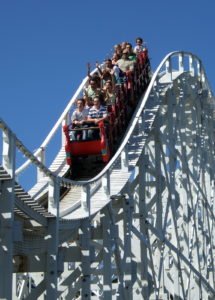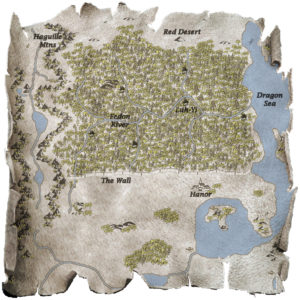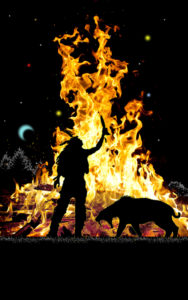So, we’ve come to the end of December and the end of 2016. To say that 2016 has been a difficult and challenging year, one so closely aligned with the loss of larger-than-life personalities and rampant disagreement, would be an understatement. As for me, 2016 has been a year of change and a recognition that I’d crossed the line from aspiring author to author.
While riding the wave from the release of my first novel, I was retired from my service in the Army Reserve. I spent the last third of my career on active duty and after surviving a necrotizing fasciitis, the demands of service were deemed to be too much for me. After almost 24 years in uniform, my life experienced a huge change to say the least.
Over the following months, my writing career gained steam. In April, I qualified for full Active Membership in the Science Fiction Writers of America. I had an unexpected email from David Brin that complimented my writing ability and my book. In June, Sleeper Protocol was featured in a BookBub ad. The resulting promotions shot my novel into the top #115 books on all of Amazon and #1 in three categories. It sold over 2,000 copies that month alone. One of my friends, Aaron Michael Ritchey, told me point blank that I was no longer an aspiring author. Halfway through 2016, I had no idea the biggest moment of my year was still to come.
When I was an ROTC instructor, teaching the next generation of Army officers at a small university in Indiana, I frequently recommended two books to my cadets. Twenty years earlier, as a cadet myself, I’d first read Starship Troopers by Robert Heinlein while in the midst of my junior year. That year, called the MS3 year, is arguably the worst for a cadet as it culminates in a summer training program designed to rank all cadets in the country from 1-n for assignments in the Army post-graduation. My junior year was not great by any means, but Starship Troopers stuck with me. As an MS4, a senior, I first read another book that would change my perception of military service. The Forever War by Joe Haldeman was equally important to my development as an officer. Starship Troopers taught me how, if necessary, to go to war. The Forever War taught me how to stay human and how to come home. They are the two most influential books I’ve ever read and they occupy a shared space on the bookshelf next to my desk. I’ve never been a real “fan boy” but I think I came really close in August.
I made the decision to attend WorldCon in Kansas City at the last possible moment. There were two major factors: my wife put off a foot surgery that opened the possibility, and then my friend Lou Berger made me an offer I couldn’t refuse. It went something like this – “How’d you like to go to lunch with Joe Haldeman?”
I couldn’t say yes fast enough.
So, we went to lunch with Joe and Gay Haldeman. During the course of lunch, I actually got a chance to tell Joe how much The Forever War had meant to me as a young cadet. We had an incredible conversation about it, his upcoming works, and then my book. Gay asked to see it, so I got a copy out of my pack and handed it to them. At that exact moment, Greg Bear and his wife stopped by. Greg patted Joe on the shoulder and then pointed at my book.
“That’s a great cover!” he said.
I started to shake. Gay and Joe had to run to a panel, but they told me they’d find me at the WordFire booth the next day. Leaving lunch, I couldn’t thank Lou enough. I hoped to see the Haldemans again, but I knew how crazy WorldCon was and tried to just bask in the conversation we’d had and my personal time with Joe.
The next day, they came by the WordFire booth where I’d spent my time camped out next to Chuck Gannon, Larry Dixon, and Mercedes Lackey (which was incredible to say the least). Gay walked up, gave me a hug, and said “We want your book.”
With shaking hands, and vision blurred from threatening tears, I signed a copy of Sleeper Protocol to Joe and Gay Haldeman. We then took pictures together and both of them hugged me before they went on their way. We’ve even since maintained email contact, which is mind-blowing. To say that meeting one of my inspirations was the highlight of 2016 would be a gross understatement. I left there energized and ready for the remainder of the year.
Since WorldCon, I’ve completed the edits for Vendetta Protocol and been hard at work on an alternate-history novel that’s been a real ass kicker. It’s a moment of change for me as it diverges from everything I’ve written up to this point. But, there’s also been a recognition that this is part of that whole writing “thing.” Challenge is always out there. We’re fortunate that so many of our inspirations and our favorite authors are approachable and willing to help – sometimes they even go to lunch with you. For that, I’ll be forever grateful.
I hope you have enjoyed our December “Year In Review” posts. From here, I transfer things over to the amazing Sean Golden for next month’s theme: Starting Over.
Happy New Year!
 only thing to do is pull out the good old hard work. Sometimes it takes wading through plot problems for a week before I can get going again. Sometimes it takes ignoring the book for a while. Sometimes it takes forcing myself to sit in my office chair and write for an hour, even if it is total crap. Sometimes it takes doing every chore in the house so I don’t have an excuse to mess around anymore. Sometimes it takes all four and then some.
only thing to do is pull out the good old hard work. Sometimes it takes wading through plot problems for a week before I can get going again. Sometimes it takes ignoring the book for a while. Sometimes it takes forcing myself to sit in my office chair and write for an hour, even if it is total crap. Sometimes it takes doing every chore in the house so I don’t have an excuse to mess around anymore. Sometimes it takes all four and then some.


